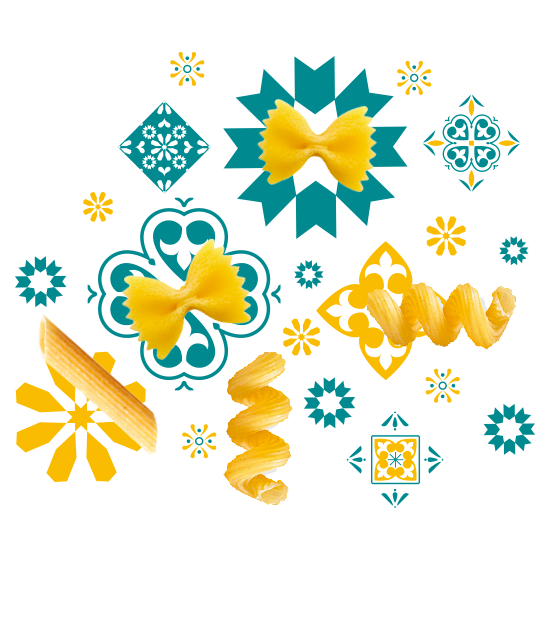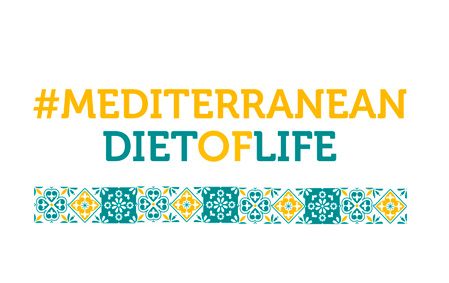

2nd EDITION / 18-25 OCTOBER 2020
Scientific evidence and nutritionists all agree: the Mediterranean Diet is the best in the world, it means longevity and wellness without sacrifices. More than a diet, a way of life.
But do we really know it? How did it change over time?
On the 2nd edition of Al Dente and on the 10th anniversary of its recognition by UNESCO as part of the Intangible Cultural Heritage of Humanity, a team of food and nutrition experts reflected on “today’s” value and meaning of the Mediterranean Diet. The result is a 10-point Guide to know it better and to discover the real secret for food wellness, beyond fashion.
The 10-point Guide of the #MediterraneanDietOfLife movement
#1
I DON’T FOLLOW FASHION TRENDS
I CHOOSE THE MOST MODERN (AND MOST ANCIENT) DIET AND I DON’T CONFUSE IT WITH THE MIRACLE DIETS EVERYBODY TALKS ABOUT.
The Mediterranean Diet is the only one that makes us live healthy and longer due to its focus on prevention. It is a “diet” meaning something more that got lost over time: a rule of conduct that does not have only to do with food.
The road to psychophysical well-being was traced centuries ago and it is linked to a healthy lifestyle. Around the table, and more generally in our life, we can allow ourselves everything, always provided the right measure and that we have the most active lifestyle.
#2
SPORT AND MOVEMENT AT THE CENTRE
A MEDITERRANEAN DIET OF LIFE IS NOT ONLY ABOUT EATING WELL AND HEALTHY, BUT ALSO ABOUT AN ACTIVE LIFESTYLE AND THE CARE ABOUT BODY AND WELLNESS.
The “Mediterranean diet of life” means to take care about ourselves even when we are not around a table: doing sport should not be considered as one of our many daily duties but rather as the dynamic part of our life that provides us with natural anti-depressants like dopamine, serotonin (the “happy hormone” contained in many Mediterranean diet dishes) and endorphins. In a virtuous circle, the Mediterranean Diet is the best for sport, according to sport medicine and food experts.
#3
I LOVE TRADITION WHEN IT CAN EVOLVE
TODAY’S MEDITERRANEAN DIET IS IN PERFECT CONTINUITY WITH YESTERDAY’S, EVEN IF IT CHANGED OVER 100 YEARS MOSTLY BECAUSE SOME OLD HABITS NO LONGER EXIST.
According to the US News & World Report, the Mediterranean Diet is “the best in the world and luckily it is in very good health”. It only needs to be aroused and encouraged by better understanding it: history teaches us that the Mediterranean model has never been a closed one and, over the centuries, it allowed the inclusion of products that turned into its main characters, like dried pasta, “invented” by the Arabs in Sicily and then spread all over the country…and the world. Today, like 50 years ago, a Mediterranean diet of life means to be curious about food and to eat healthy, without prejudices or ideologies.
#4
I HAVE NO PREJUDICES ABOUT “INDUSTRIAL” FOOD
NOWADAYS, A WIDE VARIETY OF FROZEN OR PACKED FOOD – THANKS TO FOOD TECHNOLOGY AND INNOVATION – HELPS ME TO FOLLOW THE MEDITERRANEAN DIET. WITHOUT THAT, EATING FISH AND VEGETABLES OR FOLLOWING THE CYCLE OF SEASONS WOULD BE FAR MORE DIFFICULT.
Without the food industry, the Mediterranean diet of life would be exclusively limited to a small area in Southern Italy and everybody would only eat the typical food of their own region: no oranges, olive oil and pasta in Northern Countries and no rice or butter in Southern Countries, just to make an example. More and more companies provide people with the necessary food to eat Mediterranean, according to the seasons and by guaranteeing an accessible, varied and quality diet. Moreover, the innovation of production processes and ingredients allows to create more and more balanced recipes being consistent with nutrition claims and more and more “ethical” – i.e., sustainable and short chain – to provide products that respect the land and crop diversity and support local communities.
#5
I EAT EVERYTHING AT THE RIGHT MOMENT
NO TABOOS OR EXCLUSIONS, MONOTONY IS AN ENEMY OF HEALTH. BALANCE AND HARMONY ARE THE VALUES I FOLLOW WHEN I DECIDE WHAT TO EAT AND WHEN, WHILE RESPECTING MY BODY AND MY CIRCADIAN RHYTHM.
Proper nutrition must not exclude any type of food, but also the time of day when we eat is important. A “Mediterranean diet of life” means to eat with curiosity: to combine different food, to re-discover forgotten products and cuts or try new ones. However, it is important not to leave out chrono-nutrition, which teaches us to sleep and eat at specific times and to concentrate the food intake in the moments when we are active the most: a rich breakfast, a lunch adjusted to our amount of physical activity and a lighter dinner to eat 1 or 2 hours before going to bed.
#6
I AM A CARB-FAN (AND I DON’T GIVE UP PASTA)
WHOEVER CHOOSES LOW- OR NO-CARB DIETS GIVES UP A PIVOTAL ELEMENT OF NUTRITION. FOR ME, A MEDITERRANEAN DIET OF LIFE IS NEVER WITHOUT CARBS AND PASTA. THE SIMPLER, THE BETTER: CLASSIC, WHOLE MEAL, EGG PASTA…
The attack on carbs, which should make up 55-60% of the calories in the Mediterranean Diet is a clear example of the nutrition drift into “punishments”, an example of a diet becoming a “mean” rather than a “way”, an example of food being prescribed as a drug. This is done without considering that some cells (red blood, brain and muscular cells in particular) absolutely need carbohydrates and our body reacts to the absence of this nutrient by means of the classic symptoms of hypoglycemia and fasting: weakness, perspiration, lack of concentration and attention, drowsiness, headache and blurred vision.
Whole meal pasta with vegetables and legumes is a centuries-old “Mediterranean Diet concentration”. Today, we can even count on different shades of taste and color: whole meal, other diverse meals, gluten-free…that make the Mediterranean diet of life something for every taste or nutritional need.
#7
I TRY NOT TO EAT TOO MUCH…AND I KEEP AN EYE ON PORTIONS
OUR GRAND-GRANDPARENTS ATE LITTLE BUT WERE VERY ACTIVE; WE DO EXACTLY THE OPPOSITE. SELF-CONTROL AND FOOD WASTE REFUSAL ARE VALUES I BELIEVE IN AND WHICH I TRY NOT TO FORGET WHEN I EAT.
Moderation and frugality. The Mediterranean diet of life means to follow nature cycles by eating seasonal products, to give back dignity to what we eat by enhancing the value of leftovers and by chewing longer. Researchers from Birmingham University showed that chewing long and slowly “fixes” the memory of food in our brain and reduces hunger in the hours following the main meals. Moreover, just to mention moderation, we should deeply understand the concept of portion: it is false that pasta makes gain weight if we eat 80-100 gr with the right amount of seasoning.
#8
I BELIEVE IN SUSTAINABILITY AND I CAN MAKE THE DIFFERENCE
THE MEDITERRANEAN DIET IS A FRIEND OF THE PLANET AND BY FOLLOWING IT I TAKE CARE OF MYSELF AND THE ENVIRONMENT. IT RESPECTS THE EARTH THAT REGENERATES ITSELF AND PROVIDES THE BEST FOOD AND RAW MATERIALS.
The Mediterranean Diet is the best choice also for the health of our planet. Even if it includes many types of food, it is mainly vegetable-based and it boosts the daily intake of fruits, vegetables, cereals and legumes, whose production has a low impact on the environment. For instance, the environmental print of a dish of pasta with tomatoes is just 0.492 kg. and its water footprint is just 231.4 lt. (WWF).
Today, as in the past, the Mediterranean diet of life means to be in harmony with the Earth, to be conscious about how food is selected, produced and distributed, to make choices guided by seasons and by the harmony with our body and with the planet.
Just as our grandparents did, but more globally oriented.
#9
I LOVE TO TALK ABOUT FOOD AND TO SHARE IT WITH PEOPLE
WHENEVER POSSIBLE AND I HAVE TIME TO DO SO, I LOVE TO SHARE THE PLEASURE OF EATING AND COOKING BY TAKING MY TIME WITH THOSE WHO LOVE ME.
Conviviality, the pleasure of being together, a meal shared with our beloved ones are some pivotal elements of the Mediterranean diet of life which we maybe missed the most during quarantine and which we look forward to taking back. Whenever possible people are happy to re-discover the value and the meaning of true conviviality. The proof is that during the first quarantine weeks we used food to re-discover old rituals and even cooking our grandma’s recipe, together or at a distance, was a sign of a centuries-old culture. To quote Plutarch, we do not sit around a table to eat and drink, but to eat and drink together.
#10
I AM INFORMED AND I DO NOT SHARE FAKE NEWS ABOUT FOOD
FOOD AS A CULTURAL EXPERIENCE IS AT THE CENTRE, UNDER THE SIGN OF AWARENESS AND OF GOOD AND TRANSPARENT INFORMATION, BEYOND FAKE NEWS AND PAROCHIALISMS.
The “Mediterranean diet of life” means to be conscious about food, where it comes from, how it is produced, its history, how it can be cooked and stored with an objective and lay approach and without prejudices about it, its production, its origin and its safety. In the era of the fight between misinformation and debunking, trying to verify the information telling us what to eat is an act of awareness against the tide to take control of our own and our beloved ones’ well-being and not to fall into the trap of fake news. Indeed, behind them there are often prejudices or interests and, most of all, misinformation and refusal of scientific truths.
* THE POOL OF EXPERTS WHICH WORKED ON THE CREATION OF THIS MANIFESTO AND PROVIDED ADVICE IN EACH POINT IS COMPOSED BY:
Immaculata De Vivo, Professor of Epidemiology at Harvard School of Public Health
Martina Vanda Donegani, Biologist and Nutritionist
Alice Dunin, Biologist and Nutritionist
Michelangelo Giampietro, Specialist in Sports Medicine and Nutrition Science
Manuela Mapelli, Biologist, Nutritionist and Food Technologist
Marino Niola, Contemporary Anthropologist, Co-director of Medeatresearch, the Centre of social research about the Mediterranean Diet at Suor Orsola Benincasa University in Naples
Sara Olivieri, Dietician
Luca Piretta, Gastroenterologist and Nutritionist, Professor of Food Allergies and Intolerances at Campus Biomedico University in Rome
Verdiana Ramina, Dietician
Yari Rossi, Biologist and Nutritionist
Giuseppe Scopelliti, Biologist and Nutritionist
